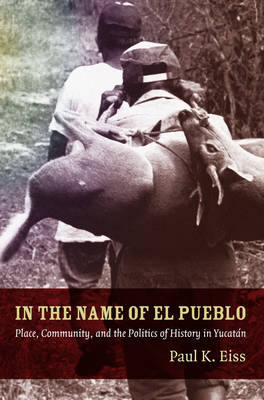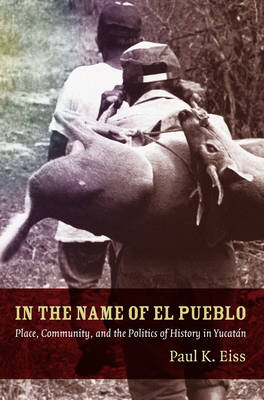
Je cadeautjes zeker op tijd in huis hebben voor de feestdagen? Kom langs in onze winkels en vind het perfecte geschenk!
- Afhalen na 1 uur in een winkel met voorraad
- Gratis thuislevering in België vanaf € 30
- Ruim aanbod met 7 miljoen producten
Je cadeautjes zeker op tijd in huis hebben voor de feestdagen? Kom langs in onze winkels en vind het perfecte geschenk!
- Afhalen na 1 uur in een winkel met voorraad
- Gratis thuislevering in België vanaf € 30
- Ruim aanbod met 7 miljoen producten
Zoeken
€ 60,95
+ 121 punten
Omschrijving
The term "el pueblo" is used throughout Latin America, referring alternately to small towns, to community, or to "the people" as a political entity. In this vivid anthropological and historical analysis of Mexico's Yucatán peninsula, Paul K. Eiss explores the multiple meanings of el pueblo and the power of the concept to unite the diverse claims made in its name. Eiss focuses on working-class indigenous and mestizo populations, examining how those groups negotiated the meaning of el pueblo among themselves and in their interactions with outsiders, including landowners, activists, and government officials. Combining extensive archival and ethnographic research, he describes how residents of the region have laid claim to el pueblo in varied ways, as exemplified in communal narratives recorded in archival documents, in the performance of plays and religious processions, and in struggles over land, politics, and the built environment. Eiss demonstrates that while el pueblo is used throughout the hemisphere, the term is given meaning and power through the ways it is imagined and constructed in local contexts. Moreover, he reveals el pueblo to be a concept that is as historical as it is political. It is in the name of el pueblo-rather than class, race, or nation-that inhabitants of northwestern Yucatán stake their deepest claims not only to social or political rights, but over history itself.
Specificaties
Betrokkenen
- Auteur(s):
- Uitgeverij:
Inhoud
- Aantal bladzijden:
- 360
- Taal:
- Engels
- Reeks:
Eigenschappen
- Productcode (EAN):
- 9780822347279
- Verschijningsdatum:
- 30/07/2010
- Uitvoering:
- Paperback
- Formaat:
- Trade paperback (VS)
- Afmetingen:
- 152 mm x 231 mm
- Gewicht:
- 521 g

Alleen bij Standaard Boekhandel
+ 121 punten op je klantenkaart van Standaard Boekhandel
Beoordelingen
We publiceren alleen reviews die voldoen aan de voorwaarden voor reviews. Bekijk onze voorwaarden voor reviews.









